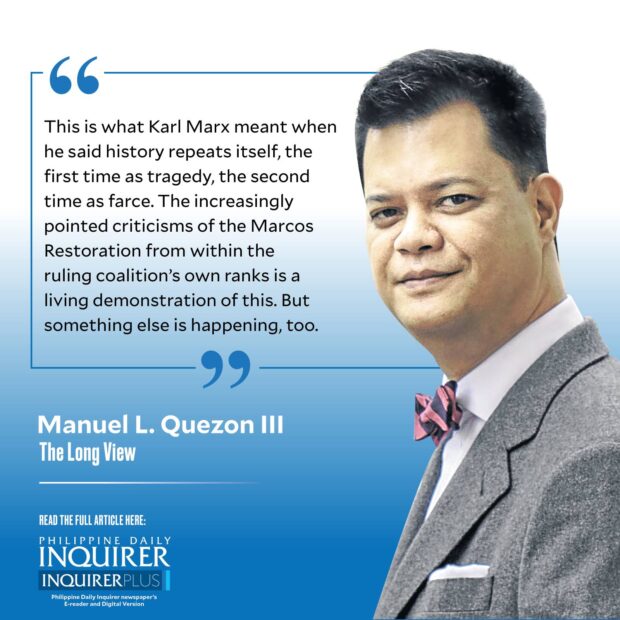Careful what you wish for
Aug. 1 marks the death anniversaries of two presidents, Manuel L. Quezon and Corazon C. Aquino. When Cory Aquino died, her continued criticism of, and opposition to, then President Gloria Macapagal Arroyo had been marked with little success and convinced many observers that as a consequence, her standing in the eyes of her countrymen had been much diminished. Some admirers even expressed the fear that her passing would be met with indifference by the public.
Instead, what happened was a kind of convulsion, as a society, unimpressed with the opposition but just as significantly unenamored with the Arroyo administration, realized how stubbornly Cory had held on to her principles, encouraging civil society and whistleblowers to speak truth to power, even as she herself was dying of cancer. This national examination of conscience led to the proposition, ratified at the polls, that the electable opposite of Mrs. Arroyo was Cory’s son, Noynoy.
It became the destiny of Rodrigo R. Duterte, in turn, to become the electable opposite of the late President Benigno S. Aquino III. This was a conclusion helped along by the long, sustained, under-the-radar but focused, and clever Marcos rehabilitation campaign which had begun in 1992 but which started harvesting hearts and minds through social media in support of Mrs. Arroyo by demonizing Mrs. Aquino, in the mid-2000s. While Ferdinand R. Marcos Jr. was elected in many ways, as the opposite of Duterte, it was still a Marcos-Duterte tandem that won, keeping the coalition in power: a feat last accomplished when Fidel V. Ramos won the presidency in 1992, ensuring a 12-year run for the Edsa coalition.
The relentless attack on the Aquinos is premised on an argument first proposed by defenders of Arroyo: “pare-pareho lang sila,” in which case success is its own reward if you subtract the possibility of idealism and principles from the equation. The Marcoses boiled it down to the past 30 years being the story of the Aquinos versus the Marcoses, which might have succeeded in taking the Aquinos down a peg as accountable and, thus, diminished by our unflattering national realities, in contrast to a young population being easily seduced by Maharlika fairy tales. Similarly, Louis Napoleon, nephew of Napoleon Bonaparte, was elected president decades after the French people had vomited out and rejected his uncle, thanks to a similar (mis)use of nostalgia.
This is what Karl Marx meant when he said history repeats itself, the first time as tragedy, the second time as farce. The increasingly pointed criticisms of the Marcos Restoration from within the ruling coalition’s own ranks is a living demonstration of this. But something else is happening, too.
It is the shrinking of the democratic space that, perhaps not so ironically but just as significantly, the Marcoses have come to comfortably inhabit, since their restoration (1992-2022) took even longer than the rise to power of the “Real Makoy” (1949-1965). I happen to believe that Ferdinand Marcos Sr., consciously or not, articulated traditional notions of the presidency and our political culture; his dictatorship received public support because it was a form of government attractive to many, even a majority, just as opposition to his regime was an expression of an authentically different culture and idea of leadership and governance. The pressures of modern life have led not just to a domestic, but global, revival of attraction for one-party, strongman rule; and this has been accompanied by a radicalization on the part of both the remaining supporters of liberal democracy versus new forms of authoritarianism.
While many of those who opposed the Marcos Restoration have turned their back on politics out of disappointment and spite, there are just as many who have become more hardline: The Marcos Restoration, in this view, stems from the Marcoses having been allowed to live. This argument, which one sees online, argues that this was the original sin of Edsa: which necessarily supports the conclusion that the core identity of people power as having been peaceful, was its ultimate shortcoming—and betrayal. On the other hand, the Marcos Restoration, even among the ranks of its coalition, was deeply flawed because it inhabits the post-Edsa institutions so comfortably, it is actually beginning to restore their functions while adhering to its organizing principles: consider human rights; consider the purge of the police; consider the relative lack of interest at the very top, in schemes to scrap the 1987 Constitution.
Having succeeded in their own desire to displace the Aquinos, the Marcoses find themselves having to ask the one the Aquinos over and over: can the Center hold?
Email: mlquezon3@gmail.com; Twitter: @mlq3





















